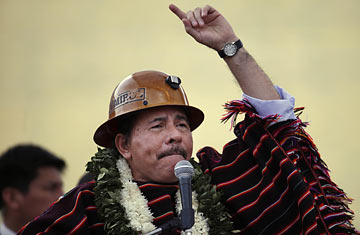
Nicaragua's President Daniel Ortega gestures as he delivers a speech in Cochabamba, Bolivia.
In a country where the terms "crisis" and "bad governance" are synonymous with politics, Nicaragua is no stranger to near-catastrophic brinksmanship by power-crazed caudillos. But even by Nicaraguan standards, the latest political crisis caused by President Daniel Ortega's push to extend his time in office has kicked the country's tinny democracy precariously close to calamity.
Unlike past battles between Ortega's Sandinista Front and opposition forces — tribal skirmishes that were mostly self-contained and had a sporting feel to them — this time the fight has been mostly one-sided and has caused collateral damage. On Tuesday, a mob of several hundred Sandinista thugs, armed with hand-held mortars, fired homemade fragmentation bombs at Managua's Holiday Inn Select hotel. Inside the building, opposition lawmakers — whose various parties form the majority in the legislature but are rarely in agreement — were discussing how to counter Ortega's attempt to reelect his cronies, and eventually himself.
The congressional session, which Ortega's ruling party claims was illegal, was held inside the Holiday Inn so lawmakers could avoid the Sandinista mobs gathered outside the National Assembly. But when the Sandinistas discovered that the opposition had pulled a fast one by convening elsewhere, they marched to the Holiday Inn and unleashed their fury on the hotel. The group fired explosives off the front of the building, shattering windows, destroying part of the roof and terrifying guests. Riot police prevented the mob from storming the lobby, but made no arrests or attempts to stop the attack.
"This is the first time anywhere in the world that a hotel has been attacked head-on like this," said Holiday Inn general manager Jose Enrique Solorzano. He estimates the damage at $20,000, plus another $20,000 in lost revenue due to canceled events and reservations. Tourists lodged at the hotel at the time of the attack fled out the back door clutching their suitcases and small children. The Nicaraguan-American Chamber of Commerce (AMCHAM) was quick to denounce the attack as an act of "terrorism" and accused the Sandinistas of "gangsterism." The country's leading tourism chamber also expressed exasperation, blaming the certain Sandinista elements for "continuously destroying the work we have done to improve our international image." Even the Organization of American States (OAS) — usually the last one to arrive at the party — expressed "profound worry" about the situation in Nicaragua and called on political leaders to preserve the country's shaky institutions.
At the heart of the crisis is Ortega's effort to remain in power, even if it means sacrificing the budding democracy that the Sandinista Revolution helped plant 20 years ago. After being voted out of power in 1990 following a decade of U.S.-sponsored counterrevolutionary war, it took Ortega 16 years and three elections to return to the presidency in 2007. He won with a twiggy victory of 38%, thanks to a divided opposition. Upon returning to the presidency, Ortega initially tried to make an effort to live up to his slogan of "Reconciliation and National Unity." One of Ortega's closest advisers told me the Sandinistas were in a "battle for legitimacy," both nationally and internationally.
But others who know Ortega warned even then that his quest for power would eventually trump his need for legitimacy. "The principal goal of Ortega is stay in power and he is going to do everything possible to do so," Ortega's former vice president Sergio Ramirez said in early 2008. Ramirez said people who think Ortega will play by the rules and step down after his term ends in 2012 are "being a bit innocent."
Then came the game-changer: the 2008 municipal elections, in which the Sandinistas were accused of massive vote fraud. After that, Ortega became more aggressive and less interested in image. He began to focus entirely on his 2011 reelection efforts, despite the constitutional ban against it. To make his plan work, Ortega needed to make sure his "dream team" government — the same officials who oversaw the 2008 elections — remained in key electoral and judicial posts. Sandinista judges on the Supreme Court did their part by overturning the constitutional ban prohibiting Ortega's reelection. The president rewarded their loyalty by passing an executive order allowing them and 23 other top magistrates to remain at their posts after their terms expire. The opposition squawked in protest.
When two Sandinista Supreme Court magistrates put Ortega's controversial decree to test last week by refusing to hand in their gavels, the situation came to a head. Instead of packing up their desks after their terms expired April 11, Sandinista judges Rafael Solis and Armengo Cuadra led a group of several hundred Sandinista supporters in a forceful takeover of the court. The mob chased off opposition judges and turned the nation's highest tribunal into a kangaroo court. Once the Sandinistas committed themselves to force, they took to the streets, triggering the current situation of anarchy.
What remains to be seen, says political analyst Cirilo Otero, is whether Nicaragua is heading "for a good fight or a bad political agreement." The analyst thinks the current crisis will most likely serve as leverage for a new power-sharing alliance — or pacto — between Ortega and opposition bosses Arnoldo Aleman and Eduardo Montealegre, who so far claim there will be no deal.
Regardless of how it ends, the latest crisis has shown that Nicaragua's rickety democracy, 20 years in the making, could come down like a Jenga tower. Says opposition lawmaker Francisco Aguirre, "Nicaragua's experience proves a powerful point, that democracy — once achieved — is not irreversible. It must be nurtured, otherwise it will wither when under attack."
